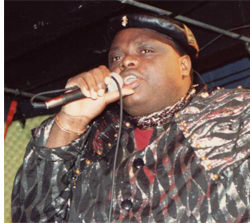|
 Kalle, Pepe (Kabasele Yampanya, Jean), Congolese singer and band leader; born Kinshasa, Dec. 30, 1951; died Kinshasa, Nov. 29, 1998. Kalle, Pepe (Kabasele Yampanya, Jean), Congolese singer and band leader; born Kinshasa, Dec. 30, 1951; died Kinshasa, Nov. 29, 1998.
Kalle got his show business break in 1972 while performing with his friends Dilu Dilumona and "Papy Tex" Matolu Dode in a neighborhood band called African Choc. Afrisa drummer Seskain Molenga, on the lookout for musicians to accompany him on surreptitious recordings, introduced African Choc to band leader and producer Verckys Kiamuangana. Molenga and his new recruits recorded a few sides together for Verckys's Vévé laber under the name Les Bakuba.
While Les Bakuba languished on Vévé's back burner, Kalle sang backing vocals on several of Verckys's own records including the brilliant "Nakomitunaka" (I ask myself). Kalle joined Bella Bella, another of the label's bands, to sing beside its leader Soki Vangu and future Quatre Etoiles member Nyboma Mwan Dido. When Vangu and Verckys parted in 1973, Kalle and Nyboma fronted Bella Bella's replacement, a new band called Lipua Lipua.
Later in 1973, as hope for the future of Les Bakuba faded, Kalle, Dilu, and Papy Tex solicited help from another label to finally get the band up and running. They called it Empire Bakuba, because a chief of the Bakuba people had been a big man like Kalle. Kalle, always large for his age, had grown into a giant who towered above six feet and weighed in the neighborhood of 300 pounds. Dubbed the "elephant of Zaire" (as Congo-Kinshasa was then known), he sang with a throaty baritone and cavorted on stage with the agility of a much smaller man.
A master of publicity, Kalle deployed his exceptional physique to maximum effect, posing in boxing trunks and gloves at the time of the 1974 Muhammad Ali-George Foreman boxing match in Kinshasa and cruising around the capital squeezed behind the wheel of a Volkswagen Beetle. In 1980 he introduced into the act a dancing dwarf named "Emoro" (Tumba Ayila), who often emerged on stage from between Kalle's legs.
Kalle was quick to embrace soukous, the up-tempo rumba produced by Paris-based Congolese, which helped lead to its acceptance in Kinshasa. His songs often discussed a serious topic even as they beckoned listeners onto the dance floor. "Dadou" from the late seventies talked of a family's difficulties brought on by an absent father. "Mister John" (1985) cautioned against ridiculing a person who has fallen on hard times. Although Empire Bakuba was his principal vehicle, Kalle occasionally recorded apart from the band. His solo Zouké Zouké (1986) and Moyibi (1988) with Nyboma were both international hits.
Kalle was a grand figure, who endeared himself to his public. Despite the economic devastation that caused most of his colleagues to move abroad, Kalle kept his base in Kinshasa. Although he was the clear leader and dominant star of Empire Bakuba, he displayed little of the ego that usually grew from such status. That his last album was recorded solo may have been a sign of growing problems within the band. Still, for most of his career, Kalle's adherence to an equalitarian philosophy made for a stable group that only came apart after his untimely death from a heart attack.
© 2011 Gary Stewart
SELECT DISCOGRAPHY
Pon Moun Paka Boug‚ (Afro Rythmes AR1007CD) 1988; Larger Than Life (Stern's STCD1038) 1992; Cocktail (N'Diaye ND061) 1998.
With Empire Bakuba: Le Phénoménal (Sonodisc CD65054) 1989; Divisé par Deux (Sonodisc CD65050) 1992; Jeunes Orchestres du Congo/Zaïre des Années 70 (Sonodisc CD36539) seventies recordings reissued 1994; Gardez Votre Souffle (Sun JWS614) 1995; 8,000 KM (Plus de Paris EPP01) 1987 recordings reissued 1996; Full Option (Babi BOP20) 1997.
With Nyboma: Moyibi (Syllart 38752-2) 1988.
With Tabu Ley Rochereau: Feu d'Artifice (Sonodisc CDS5505) 1992.
SELECT BIBLIOGRAPHY
O. Ouedraogo, "L'Empire Bakuba du Zaire," Bingo (no. 410, Mar. 1987); C. Stapleton & C. May, African All-Stars (London, 1987); R. Prince, "Direct Attack!," Folk Roots (no. 94, Apr. 1991); G. Stewart, "Pepe Kalle," The Beat (vol. 18, no. 1, 1999); C.C. Smith, "Pepe Kalle: Larger Than Life," The Beat (vol. 18, no. 1, 1999); G. Stewart, Rumba on the River (London and New York, 2000).
|

